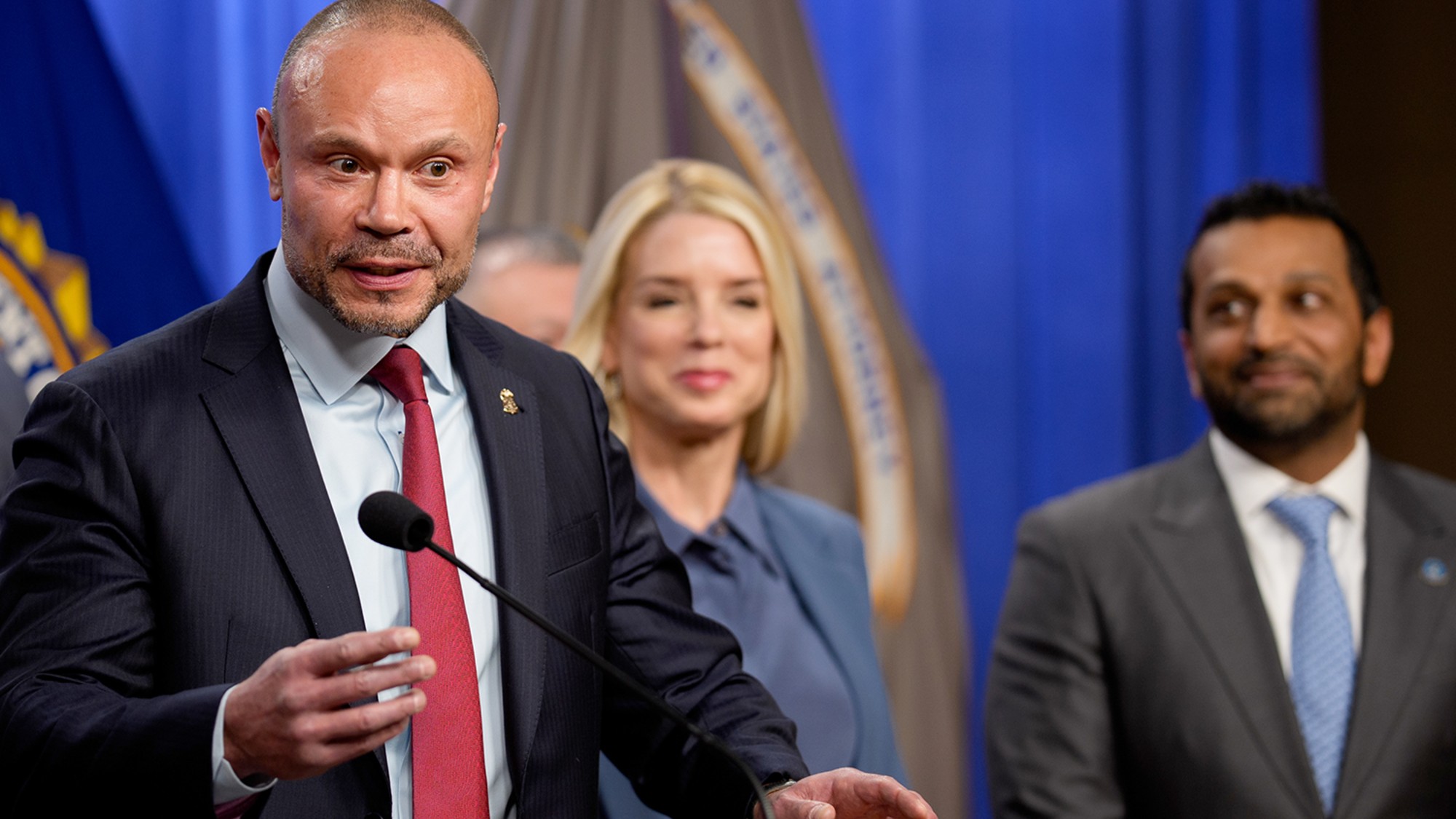'Replacement' theories are wrong. Here's why they keep coming back.
And why focusing on the supply side of disinformation is a mistake


A free daily email with the biggest news stories of the day – and the best features from TheWeek.com
You are now subscribed
Your newsletter sign-up was successful
Imagine a community whose historic ethnic majority is in relative decline. Despite a record of electoral victories, it seems unable to halt cultural and economic changes that many long-time residents oppose. With political institutions impotent or indifferent, disillusionment becomes pervasive. At first in whispers, then openly, people begin to speculate about a conspiracy to drive out the existing population to make room for a new cohort that's more appealing to a shadowy elite.
Given this week's events, you probably think I'm talking about so-called Great Replacement Theory. Belief that an international, likely Jewish, cabal is promoting immigration with the intention of undermining, oppressing, and eventually killing whites apparently inspired the murder of 10 and injury of three more in a Buffalo supermarket on Saturday. The basic tropes have been the same for centuries. But the phrase "great replacement" is attributed to the French writer Renaud Camus, who published an essay with that title in 2011.
But conspiracy theories about betrayal and replacement aren't limited to white supremacists. The story I conjured about demographic change and nativist suspicion could also describe Washington, D.C., over the last 50 years.
The Week
Escape your echo chamber. Get the facts behind the news, plus analysis from multiple perspectives.

Sign up for The Week's Free Newsletters
From our morning news briefing to a weekly Good News Newsletter, get the best of The Week delivered directly to your inbox.
From our morning news briefing to a weekly Good News Newsletter, get the best of The Week delivered directly to your inbox.
Facing urban renewal, gentrification, aggressive yet somehow ineffective policing, and other developments that seemed hostile not only to their preferences but to their very existence, many Black Washingtonians have concluded they are victims of a coordinated effort to bleach what was once known as "Chocolate City." Coined in 1979 by newspaper columnist Lillian Wiggins, "the master plan" — later shortened to "The Plan" — became an enduring mythology that purported to explain not only relative decline in the Black population but also the capital's transformation into a gleaming destination city. In 2017, former city councilor Kevin Chavous introduced an even more lurid version in a self-published novel that revolves around a plot to exterminate millions of minority school children by poisoning school lunches.
The point of comparing The Great Replacement with The Plan isn't to suggest the situations are equivalent. For one thing, African Americans have particular historical reasons to distrust the government and other major institutions. It's striking how white fears of what might happen if they become a minority mirror Black Americans' actual experience. In addition to organized violence and systematic exclusion, that includes intentional displacement: Until the Civil War, even opponents of slavery mostly believed Black people could play no part in a essentially white nation and should be returned to their "real" home in Africa. And, within living memory, open racism played an important role in housing and development policy.
Moreover, it's not clear that whites really face minority status. My colleague Damon Linker has pointed out that Americans overestimate the size of minority populations. Demographers predict that at some point around 2050, the non-white population of the U.S. will become larger than the white population. But whites would remain a significant plurality even if ethnic identification remains constant — and there's reason to think that won't happen. Because the children of ethnic intermarriage often describe themselves as white regardless of their ancestry, predictions of white decline may turn out to be premature.
Still, the comparison sheds light on the origins and appeal of conspiracy theories. A currently fashionable account, often linked to the concept of "disinformation," emphasizes the supply side: The hypothesis is that false and dangerous ideas seduce audiences who would otherwise be unaware or indifferent to such outlandish thinking. It seems to follow that the best strategy is to prevent the publication and circulation of those ideas. New York Governor Kathryn Hochul (D) made this logic of censorship explicit in comments on Sunday, when she suggested "hate speech" and "incendiary speech" is not protected by the First Amendment.
A free daily email with the biggest news stories of the day – and the best features from TheWeek.com
Hochul's assertion is incorrect as a matter of constitutional law. What's more important, though, is that supply-side responses don't understand why or when conspiracy theories flourish. Like The Plan, The Great Replacement isn't a brain germ that infects anyone exposed to it. It's a way to make sense of real experiences when reality doesn't correspond to our expectations. The demand for coherence is the reason stories that seem obscure and implausible in themselves come to feel like common sense even to people who are neither murderous nor crazy.
Imagining a single cause for a range of events is an important element of that search for understanding. Our brains don't do well with complicated, multicausal explanations. We instinctively seek intention, attributing outcomes to a single will even where none exists. You don't need an ideological puppet master to explain the cultural, economic, or political changes that Washington or the United States have experienced. But it's a easier to blame one than to think about institutional incentives, technological developments, or other powerful yet impersonal factors.
Moreover, the absence of a secret plan executed by disciplined cadres doesn't mean that social changes happen spontaneously. While no one has direct control over birth rates or migration patterns, these phenomena are influenced by policy choices that could have been otherwise. In the case of The Plan, that includes amenities intended to attract more affluent residents as low interest rates and other background conditions pumped up housing prices. At the core of recent American variants of the Great Replacement is a series of liberal policies dating back to the Hart-Celler Act of 1965, which opened the United States to massive immigration from Latin America and Asia despite supporters' explicit promises that this would not happen.
You can make the case that the benefits of such policies outweigh the costs. But it's not plausible to depict their consequences as simply beyond control, like the weather. When it comes to resisting fantasies of subversion, such denial is not helpful either. The very implausibility of attempts to dismiss human agency heightens the appeal of conspiracy theories that exaggerate it.
Triumphalist rhetoric about wrenching changes stimulates demand for conspiracy theories, too. Whether or not they turn out to be accurate, predictions of the death of white America have become elements of a strange kind of moralism, in which a shifting ethnic and racial mix serves as divine judgment on a sinful nation. Last year, Washington Post columnist Jennifer Rubin hailed Census data showing a declining number of white Americans as "fabulous news." Even if they didn't express quite the same glee, many journalists and political strategists have argued since Obama's victory in 2008 that Democrats were destined to rule a majority-minority America. If the 2020 election results and recent polls are any guide, that's not true. But it's not surprising that the embrace of demographic determinism by elements of cultural left and the Democratic Party has encouraged, although it didn't create, a parallel response on the right.
The genuinely good news is that most Americans don't believe in such conspiracy theories. Contrary to claims of pervasive racism, a considerable majority think a shrinking white share of the population is neither good nor bad. And even those who disagree are unlikely to commit murder inspired by their beliefs (although they may cite political motives, lone wolf terrorists like Payton Gendron, the alleged attacker in Buffalo, and alleged New York subway shooter Frank James tend to have histories of mental illness). Those who do deserve the most severe punishment. But justified outrage at the promoters of such theories, whether full-strength or watered-down versions, shouldn't obscure the conditions that make them appealing. Where and when people feel confused, despised, and powerless, the same kinds of stories will creep back into the public square.
Samuel Goldman is a national correspondent at TheWeek.com. He is also an associate professor of political science at George Washington University, where he is executive director of the John L. Loeb, Jr. Institute for Religious Freedom and director of the Politics & Values Program. He received his Ph.D. from Harvard and was a postdoctoral fellow in Religion, Ethics, & Politics at Princeton University. His books include God's Country: Christian Zionism in America (University of Pennsylvania Press, 2018) and After Nationalism (University of Pennsylvania Press, 2021). In addition to academic research, Goldman's writing has appeared in The New York Times, The Wall Street Journal, and many other publications.
-
 Why are election experts taking Trump’s midterm threats seriously?
Why are election experts taking Trump’s midterm threats seriously?IN THE SPOTLIGHT As the president muses about polling place deployments and a centralized electoral system aimed at one-party control, lawmakers are taking this administration at its word
-
 ‘Restaurateurs have become millionaires’
‘Restaurateurs have become millionaires’Instant Opinion Opinion, comment and editorials of the day
-
 Earth is rapidly approaching a ‘hothouse’ trajectory of warming
Earth is rapidly approaching a ‘hothouse’ trajectory of warmingThe explainer It may become impossible to fix
-
 Kurt Olsen: Trump’s ‘Stop the Steal’ lawyer playing a major White House role
Kurt Olsen: Trump’s ‘Stop the Steal’ lawyer playing a major White House roleIn the Spotlight Olsen reportedly has access to significant US intelligence
-
 The billionaires’ wealth tax: a catastrophe for California?
The billionaires’ wealth tax: a catastrophe for California?Talking Point Peter Thiel and Larry Page preparing to change state residency
-
 Bari Weiss’ ‘60 Minutes’ scandal is about more than one report
Bari Weiss’ ‘60 Minutes’ scandal is about more than one reportIN THE SPOTLIGHT By blocking an approved segment on a controversial prison holding US deportees in El Salvador, the editor-in-chief of CBS News has become the main story
-
 Pipe bombs: The end of a conspiracy theory?
Pipe bombs: The end of a conspiracy theory?Feature Despite Bongino and Bondi’s attempt at truth-telling, the MAGAverse is still convinced the Deep State is responsible
-
 Has Zohran Mamdani shown the Democrats how to win again?
Has Zohran Mamdani shown the Democrats how to win again?Today’s Big Question New York City mayoral election touted as victory for left-wing populists but moderate centrist wins elsewhere present more complex path for Democratic Party
-
 Millions turn out for anti-Trump ‘No Kings’ rallies
Millions turn out for anti-Trump ‘No Kings’ ralliesSpeed Read An estimated 7 million people participated, 2 million more than at the first ‘No Kings’ protest in June
-
 ‘Conspiracy theories about her disappearance do a disservice’
‘Conspiracy theories about her disappearance do a disservice’Instant Opinion Opinion, comment and editorials of the day
-
 Ghislaine Maxwell: angling for a Trump pardon
Ghislaine Maxwell: angling for a Trump pardonTalking Point Convicted sex trafficker's testimony could shed new light on president's links to Jeffrey Epstein
